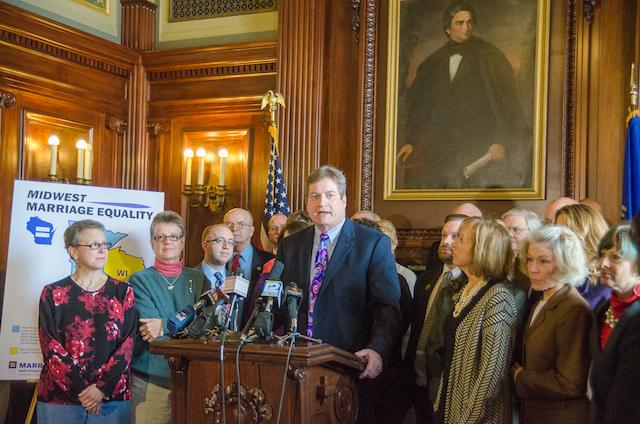Discriminatory state bans on same-sex marriage are increasingly being struck down by federal district courts. These recent decisions flow naturally from the U.S. Supreme Court’s essential holding in U.S. v. Windsor. More recently, Wisconsin same-sex couples have sued state officials to invalidate Wisconsin’s ban on same-sex marriage in Wolf and Schumacher v. Walker. Regardless of what the federal district court rules in Wolf, it is readily apparent that all state bans on same-sex marriage will soon be held unconstitutional by the Supreme Court. Finally, people whose lives don’t fit into a rigid heteronormative paradigm will find themselves at the long awaited gates of justice.
Under Wisconsin’s constitution, marriage is defined as occurring “between one man and one woman.” Furthermore, the state constitution forbids Wisconsin from recognizing “a legal status identical or substantially similar to that of marriage for unmarried individuals.” Currently, the Wisconsin Supreme Court is in the process of deciding Appling v. Doyle, a case involving a state constitutional challenge to Wisconsin’s domestic partnership law. Appling argues that Wisconsin’s domestic partnership law confers “a legal status identical or substantially similar to that of marriage for unmarried individuals.” It should be clear that Wisconsin’s domestic partnership law does not violate the Wisconsin Constitution.
From a practical standpoint, though, the Wisconsin Supreme Court’s future decision in Appling is likely to soon be moot. The Supreme Court struck down the Defense of Marriage Act last summer as violating the Fifth Amendment in Windsor. The court emphasized its past holdings that “a bare . . . desire to harm a politically unpopular group” cannot constitute a legitimate state interest. The court ultimately concluded that DOMA reflected animus toward homosexuals and was thus unconstitutional. After the Court decided Windsor, though, it was unclear how lower courts would apply Windsor’s reasoning to state bans on same-sex marriage. As Justice Antonin Scalia foreshadowed in his Windsor dissent, “State and lower federal courts should take the Court at its word and distinguish away” future cases involving bans on same-sex marriage.
Although it was unclear how federal district courts (and ultimately the Supreme Court) would handle constitutional challenges to state same-sex marriage bans immediately after Windsor was decided, the future of bans on same-sex marriage is now crystal clear. In the last few months, two federal district court judges in conservative-leaning states have emphatically held that marriage is a fundamental right, meaning that bans on same-sex marriage must be subject to strict judicial scrutiny. Thus, states may not prevent same-sex couples from entering into state-sanctioned marriages unless the state has a compelling governmental interest, and the same-sex marriage ban is narrowly tailored toward accomplishing that interest.
The two federal district courts in question held that Utah and Virginia’s state bans on same-sex marriage were not narrowly tailored towards accomplishing a compelling government interest and thus were unconstitutional under the 14th Amendment’s Due Process Clause. Additionally, the two district courts held that the respective state bans on same-sex marriage violated the 14th Amendment’s Equal Protection Clause because the bans, like DOMA in Windsor, reflected animus toward homosexuals.
These recent decisions by federal district court judges demonstrate the beginning of the end for state bans on same-sex marriage. The district court judge in Utah noted that Scalia recognized in his Windsor dissent that state bans on same-sex marriage would be unconstitutional under the Court’s holding in Windsor. As Scalia wrote in his Windsor dissent, “[T]he view that this Court will take of state prohibition of same-sex marriage is indicated beyond mistaking by today’s opinion.” If DOMA is unconstitutional “[h]ow easy it is, indeed how inevitable, to reach the same conclusion with regard to state laws denying same-sex couples marital status.”
Scalia is entirely correct. The essential holding of Windsor compels courts to strike down state bans on same-sex marriage. The court in Windsor was concerned with the dignity and equal rights of same-sex couples, including the children of same-sex couples. As Justice Anthony Kennedy wrote for a majority of the Court, bans on same-sex marriage interfere “with the equal dignity of same-sex marriages, a dignity conferred by the States in the exercise of their sovereign power.” Kennedy further emphasized that bans on same-sex marriage “humiliate tens of thousands of children now being raised by same-sex couples. The[y] make it even more difficult for the children [of same-sex couples] to understand the integrity and closeness of their own family and its concord with other families in their community and in their daily lives.” Although the Court discussed the importance of federalism in Windsor, it is clear that an individual state cannot use federalism principles to deny people their constitutional rights.
It is a near certainty that one or more of these recent court decisions, including the future decision in Wolf, will make its way up to the Supreme Court. When it does, Kennedy will lead the Court in holding that all state bans on same-sex marriage violate the Constitution. Same-sex marriage will be legal, regardless of anyone’s own personal views on marriage. Our country will have moved ever closer to upholding its ideal of providing liberty and justice for all.
Aaron Loudenslager (loudenslager





















